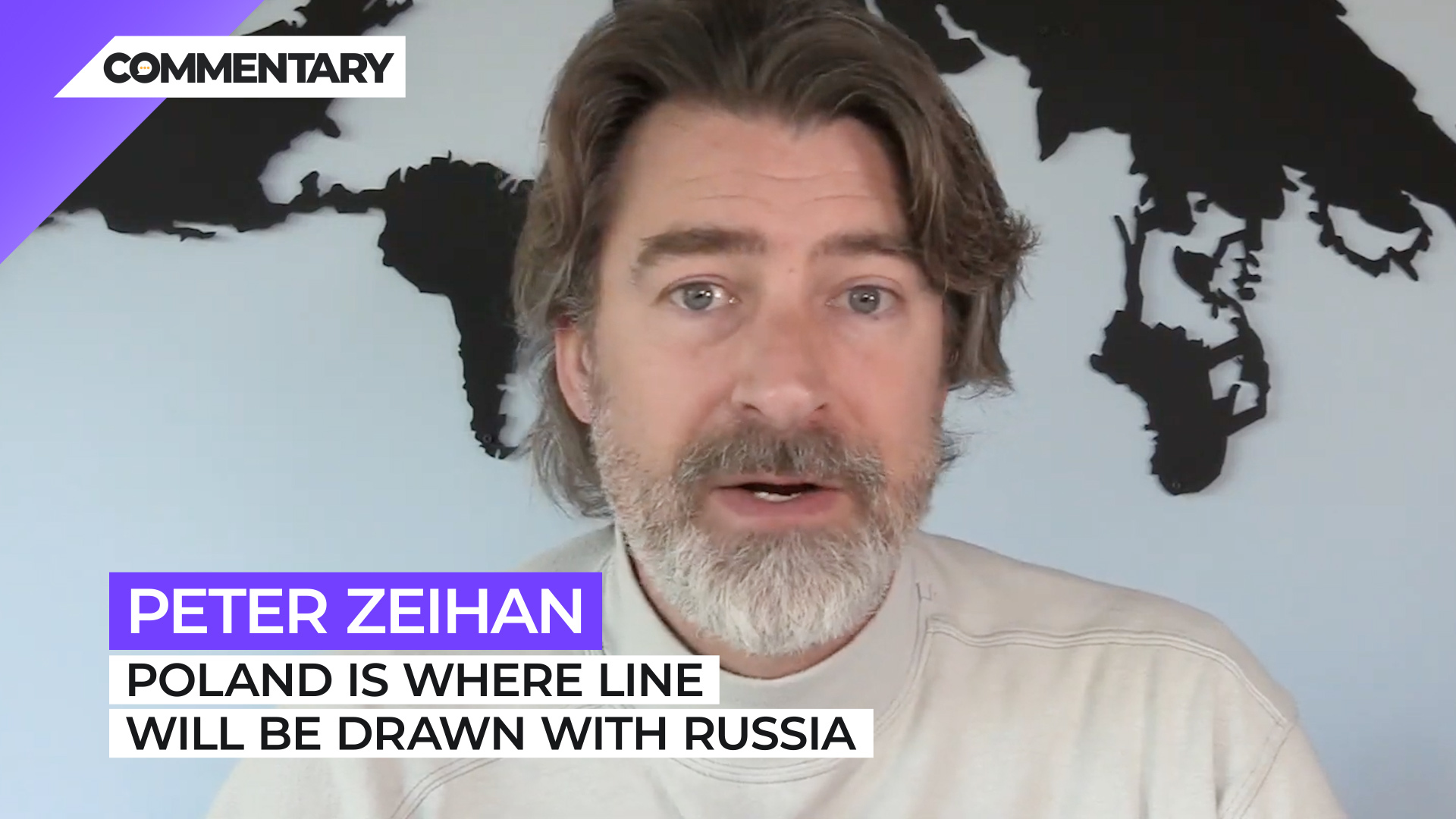
Commentary
-
Our commentary partners will help you reach your own conclusions on complex topics.
Wanted to talk today about some of the events that happened on the weekend of April three to April four.
The one that has really hit the headlines is that the Ukrainians have managed to push the Russians back north of Kyiv and have entered a number of towns where they have found hundreds of people who were, to be perfectly blunt, murdered.
There were entire streets where there was a dead man outside of each house where the Russians had gone in, grabbed the head of household, and simply executed them. There were several dozen bodies that were found with their hands bound and shot execution style. And then there were more than a handful of mass graves.
As the Ukrainians have advanced further north, we know that the original massacre that was discovered in Bucha on April 3rd has now been replicated in a number of other locations.
So we are definitely looking at war crimes quality of activity here.
The only real question in that is: who is ultimately really responsible? A regiment commander? The theater commander? Putin himself? Individual foot soldiers? We don’t have an answer for that, but this definitely qualifies as war crimes under any definition you could care to use.
Almost lost in the background of that was a statement by the deputy prime minister of Poland. One Jarosław Kaczyński, that he was open, that Poland was open to the idea of the United States stationing nuclear weapons on Polish soil.
Now, normally when American troops and American nukes come into the discussion, the answer is usually not just no or an emphatic no, but a lot of grand standing about the no.
The United States in order to have a foreign deployment of size requires something called a status of forces agreement that requires the local government to basically stand aside.
If there are any crimes committed by American forces, they’ll be tried by an American military court, and because of that, the United States has very few large scale deployments unless there’s something else in play.
So for example, today, the United States only has three significant deployments, Germany and Japan, where the SOFA agreements date back to World War II and in Korea where they date back to the Korean War.
So there are mitigating factors in all of these that have prevented the United States from having large scale forces, really anywhere else.
And so here we have a European leader actively, publicly, advocating, not just for American forces, but for the most typically politically divisive type of forces that the Americans have, the nuclear arsenal.
The questions is why and why now?
Let’s start with Kaczynski himself. He may be deputy prime minister, but he’s actually the guy who’s in charge of Poland. In many ways, Kaczynski is a combination of some of the less desirable aspects of Barack Obama, Donald Trump, and Williams, William Jennings, Bryan. He’s a populist, he’s a nationalist, he’s a horrible manager, and he has refused to go away.
He has been at or near the top of the Polish political scene now for roughly 20 years. And his position as DPM allows him to tell everyone to what to do without having the day-to-day responsibilities for actually carrying out the job. So it’s kind of the perfect spot for someone who’s not good at management, but has the charisma to attract a lot of votes, and he’s made a good world for himself.
What that means, of course, is that Kaczynski, regardless of what you think of his personality or his politics, does speak for the Polish government, because he really is the Polish government. So that’s the who.
Let’s talk about the why. Right now the dominant concern in NATO countries is that the Russians will not stop not just until they’ve gotten all of Ukraine, but until they’ve moved beyond Ukraine. The problem is for the Russians to feel secure, they need to secure a series of gateway territories that separate the Russian space from the rest of the world.
And Putin’s goals for the last 20 years is about getting Russian troops on the ground in as many of those gateways as possible. That’s what the Georgian war was about, in part that’s what Nagorno-Karabakh was about, that’s what the Crimea war was about.
Ukraine, unfortunately for the Ukrainians, sits between the Russians in two of those gateways, the Bessarabian Gap that moves over into the Turkish space and the Polish gap, which goes into Poland and the German space, which means that if the Russians do succeed in conquering Ukraine, and I’m still of the belief that in time with a sufficient application of artillery and inhuman violence, they will, then the next stop is to move into Ukraine.
The specifics of the Polish gap is that it’s a, it’s where the plain narrows. So if you are east of Poland, the flatlands of central Eurasia and Eastern, sorry, what central Eurasia and Eastern Europe are about 2000 miles north and south, but then it suddenly narrows at the Belarusian Polish border to about 300 miles.
And then it narrows to about half of that as you move into Poland, between the Carpathians and something called Masurian Lake District, which is simply too boggy and rugged for tanks to move through.
So from the Russian point of view, they don’t have to just get Ukraine. They need to move into Poland proper and fairly deep into Poland proper. The large, the logical stopping point for a Russian advance would be the Eastern outskirts of the city of Warsaw, right on the Vistula River. That’s the logical break point. It’s the narrowest point of the plain. There’s a river to provide a defensive bulwark.
So, if you’re in Poland, and you can read a map, you know that if the Russians win in Ukraine, they’re coming for you one way or another. Ergo Why he wants Nukes. The question is will the United States do it?
And if so, how? The problem is that the United States has had nuclear weapons in Europe, specifically in Germany now for decades. And yes, it’s a deterrent. I don’t mean to suggest otherwise, but if you really want to stop the Russians from entering Poland, you don’t just need a nuclear facility. You would need the army facilities to protect it as well. You don’t just tend a nuke unescorted. The question then is where would the base be? If you put it to the west of Warsaw, to the west of the Vistula River, on the west side of the gap, the Russians will interpret that as an oblique acknowledgement that anything east of the river is theirs. So if the goal is to stop Russia, before it can move into NATO territory, you need to put the American facilities as far east in Poland as is possible. So that the Russians know that the day they cross the border they’re facing American troops directly, that, of course, puts them directly in harm’s way, which is the whole point.
So, where does this take us? We’ve got a Russia who is already been demonstrated to be boundless in its cruelty, because it sees this war as an existential threat. They’re not going to stop.
And while I might personally have some issues with the Polish deputy prime minister, he’s not wrong. If the goal here is to prevent a NATO-Russian fight, and for whatever reason, we can’t stop that in Ukraine.
Poland is where the line will be drawn, and that requires forward positioned troops to make it stick, whether it’ll be done or not, of course is up to the politics of the Europeans and Washington. And it’s simply too soon to know how that’ll shake out, but this is going to be the debate. All right. It that’s everything for me until next time.
-
Hurricane Helene hits US coast, Appalachia and beyond
Hurricane Helene hit Florida and Georgia overnight between Sept. 26 and 27 as a Category 4 hurricane, and accompanying storms will continue reaching deeper into the continental United States today. Dangerous flash flooding from the hurricane, known as storm surge, was some of the worst flooding that the Tampa Bay area has ever seen, and… -
Israel holds upper hand against Lebanon, Hezbollah and Iran
On Wednesday, Sept. 25, Hezbollah launched a ballistic missile at Tel Aviv in retaliation for Israel’s explosive pager attack that blew up devices across Lebanon. Although Israel’s defense systems intercepted the surface-to-surface missile, the attempted strike on Tel Aviv marked a significant escalation by Hezbollah. Since the siege on Gaza began, shortly after the Oct. 7, 2023,… -
The Sinaloa Cartel civil war
Fears of a civil war within the Sinaloa Cartel are growing as violence between competing factions within the cartel continues. The Mexican Army has dispatched around 600 elite troops to Sinaloa to help quell those fears, in addition to roughly 2,200 regular soldiers and National Guard. Watch the above video as Straight Arrow News contributor… -
New Ukrainian weapons hit Russia where it hurts
Ukrainian drones struck a major Russian ammunition depot, triggering a massive explosion that was captured on camera. According to the Ukrainian military, 2,000 tons of munitions had arrived at the depot before the attack. Over the past two years, Ukraine has significantly increased its domestic drone production, allowing it to scale up attacks on military… -
Weighing social costs vs. economic benefits on immigration
Global human migration is one of the defining elements of our current historical era, according to the United Nations. Migrants face both the incentives to leave — forced out by climate change, crime and corruption, extreme poverty or violence — and incentives for where to go, based on available job opportunities and so on. Migration…
Latest Stories
-

CNN faces defamation trial over Afghanistan evacuation report
-
 Getty Images
Getty Images
Self-driving vehicle company Waymo gets $5.6B to expand, despite challenges
-
 Getty Images
Getty Images
Massive fire at US base in South Korea extinguished after 19 hours
-
 Getty Images
Getty Images
Dodgers-Yankees World Series matchup the more classic kind of ‘moneyball’
-
 Getty Images
Getty Images
Federal judge orders Virginia to restore more than 1,600 voter registrations
Popular Opinions
-
In addition to the facts, we believe it’s vital to hear perspectives from all sides of the political spectrum.
Latest Opinions
In addition to the facts, we believe it’s vital to hear perspectives from all sides of the political spectrum. We hope these different voices will help you reach your own conclusions.
The opinions published in this section are solely those of the contributors and do not reflect the views of Straight Arrow News.

















Latest Commentary
We know it is important to hear from a diverse range of observers on the complex topics we face and believe our commentary partners will help you reach your own conclusions.
The commentaries published in this section are solely those of the contributors and do not reflect the views of Straight Arrow News.
Dr. Frank Luntz
Pollster and Political Analyst‘Awful’: Americans discuss Congress, Supreme Court, capitalism
‘Divided we fall’: Americans discuss concerns for democracy
‘That was great’: Undecided voters react to Walz-Vance debate